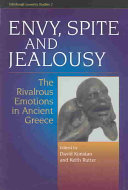

Most ebook files are in PDF format, so you can easily read them using various software such as Foxit Reader or directly on the Google Chrome browser.
Some ebook files are released by publishers in other formats such as .awz, .mobi, .epub, .fb2, etc. You may need to install specific software to read these formats on mobile/PC, such as Calibre.
Please read the tutorial at this link: https://ebookbell.com/faq
We offer FREE conversion to the popular formats you request; however, this may take some time. Therefore, right after payment, please email us, and we will try to provide the service as quickly as possible.
For some exceptional file formats or broken links (if any), please refrain from opening any disputes. Instead, email us first, and we will try to assist within a maximum of 6 hours.
EbookBell Team

4.8
94 reviewsClassical Greece was permeated by a spirit of rivalry. Games and sports, theatrical performances, courtroom trials, recitation of poetry, canvassing for public office, war itself -- all aspects of life were informed by a competitive ethos. This pioneering book considers how the Greeks viewed, explained, exploited and controlled the emotions that entered into such rivalrous activities, and looks at what the private and public effects were of such feelings as ambition, desire, pride, passion, envy and spite.
Among the questions the authors address: How was envy distinguished from emulation? Was rivalry central to democratic politics? What was the relation between envy and erotic jealousy? Did the Greeks feel erotic jealousy at all? Did the views of philosophers correspond to those reflected in the historians, tragic poets and orators? Were there differences in attitude towards the rivalrous emotions within ancient Greece, or between Greece and Rome? Did jealousy, envy and malice have bad effects on ancient society, or could they be channelled to positive ends by stimulating effort and innovation? Can the ancient Greek and Roman views of envy, spite and jealousy contribute anything to our own understanding of these universally troubling emotions?
This is the first book devoted to the emotions of rivalry in the classical world taken as a whole. With chapters written by a dozen scholars in ancient history, literature and philosophy, it contributes notably to the study of ancient Greece and to the history of the emotions more generally.